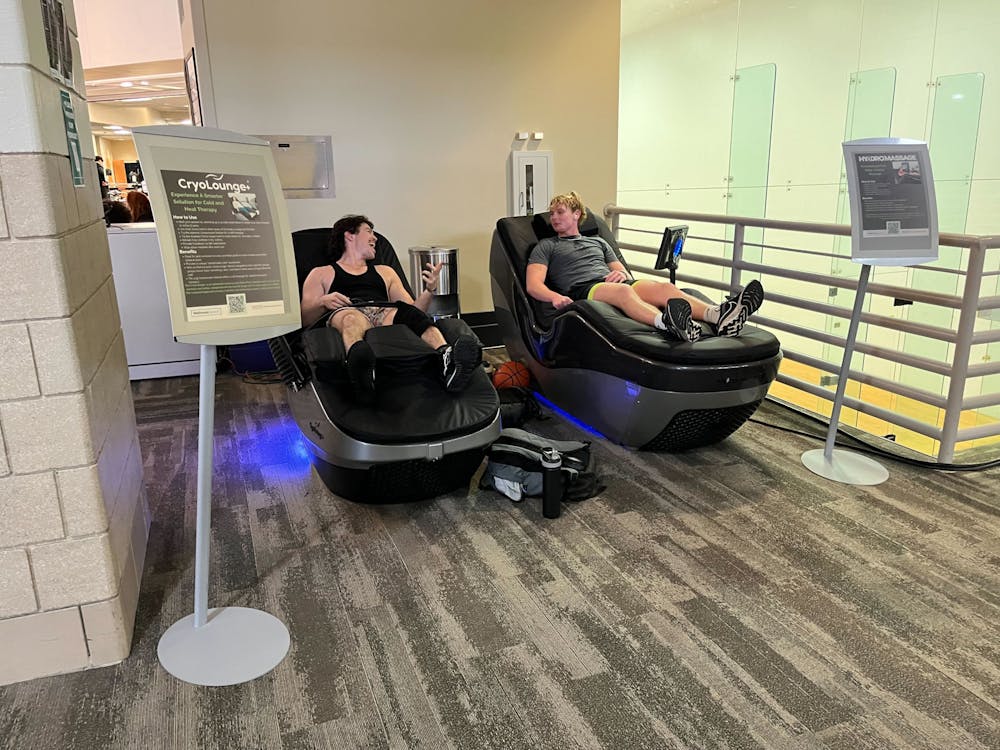Ping Recreation Center now offers new equipment geared toward relaxation, recovery and mindfulness, but the additional equipment is part of a larger project that Well-Being and Recreation and also Counseling and Psychological Services, or CPS, partnered on together to create a space for people within Ping that focuses on mental and social health and social well-being.
The space, which is not currently named, is expected to be unveiled at the beginning of the 2024 Fall Semester. In preparation for the space Ping is demoing – with the intention of eventually purchasing – three new pieces of equipment from WellnessSpace Brands, each costing more than $15,000, Director of Well-Being and Recreation Wes Bonadio said.
The HydroMassage is a recovery bed that uses waves of heated water to target specific areas of the body for a personalized massage as Ping attendees lie atop it. The CryoLounge+ is another, similar recovery bed that uses targeted water streams for muscle recovery, offering hot and cold water options. The machine mimics the sensation of an ice bath to enhance post-workout recovery.
The RelaxSpace is a mindfulness machine that uses a multi-sensory approach to focus on relaxation. The machine uses visual, auditory, temperature and scent controls to reduce stress and promote relaxation.
Bonadio said Well-Being and Recreation has a survey feedback form for students to express what they want from the space and the units. He said the feedback has been overwhelmingly positive for all three units.
“Hopefully, that's another part of this initiative is that we're showing that we care, we need to be connected to what students are connected to," he said. “Your feedback and your interests, wants or desires are going right into what we're going to be able to provide.”
Bonadio said a barrier for Ping attendance is that it can be intimidating. He said the rock climbing wall can produce a scary first impression for some people, so adding the wellness equipment at the front of the gym may make Ping seem more inviting.
“We just want people to be able to feel comfortable coming in the doors,” Bonadio said.
Assistant Director of Outreach and Consultation at CPS Stephanie Maccombs-Hunter, said from her perspective, Syracuse University’s MindSpa wellness rooms inspired Ping’s wellness initiatives.
Hunter said OU’s wellness space will incorporate wellness tactics such as arts and crafts, lightbox therapy, study areas and creative seating. Hunter also said the space would have mindfulness, sensory and self-reflective activities.
“We're looking … to provide a space for people to really work on not just their physical health, but their mental health,” Bonadio said.
The equipment and the space are a part of the university’s campus-wide THRIVE program. THRIVE is a student-focused, well-being initiative that provides services, events and programming to help students prioritize their individual wellness needs and goals.
Hunter said mental well-being is essential in maintaining all other forms of well-being.
“If your mental well-being is low, you're more likely to develop physical health complications and vice versa,” Hunter said. “If your physical health is low, you're more likely to develop mental health complications. Knowing this, everything that we do is through the lens of promoting mental well-being and collaborating with partners across campus who address other areas of well-being.”
The interdepartmental initiative gained traction among students who are learning to balance their college experience. Avery Tyla, a first-year journalism student, said she uses the new equipment as a way to reward herself after a hard workout.
“It's nice to give yourself that reward,” Tyla said. “Not that working out isn't already a great thing for your body and a great thing for your mind, but having that little reinforcement … (that) you did good (is great).”
Hunter said the importance of providing these spaces lies in decreasing mental health stigmas, strengthening communities and, ultimately, creating a greater sense of belonging among OU students.
“We are now creating these spaces to take care of your physical and mental health,” Hunter said. “It is my hope that more students will take some self-reflective time to understand their mental health and use these spaces as self-care … I think there are a lot of benefits that can come from these spaces, especially in creating safe spaces outside of the four walls of a counseling room.”






